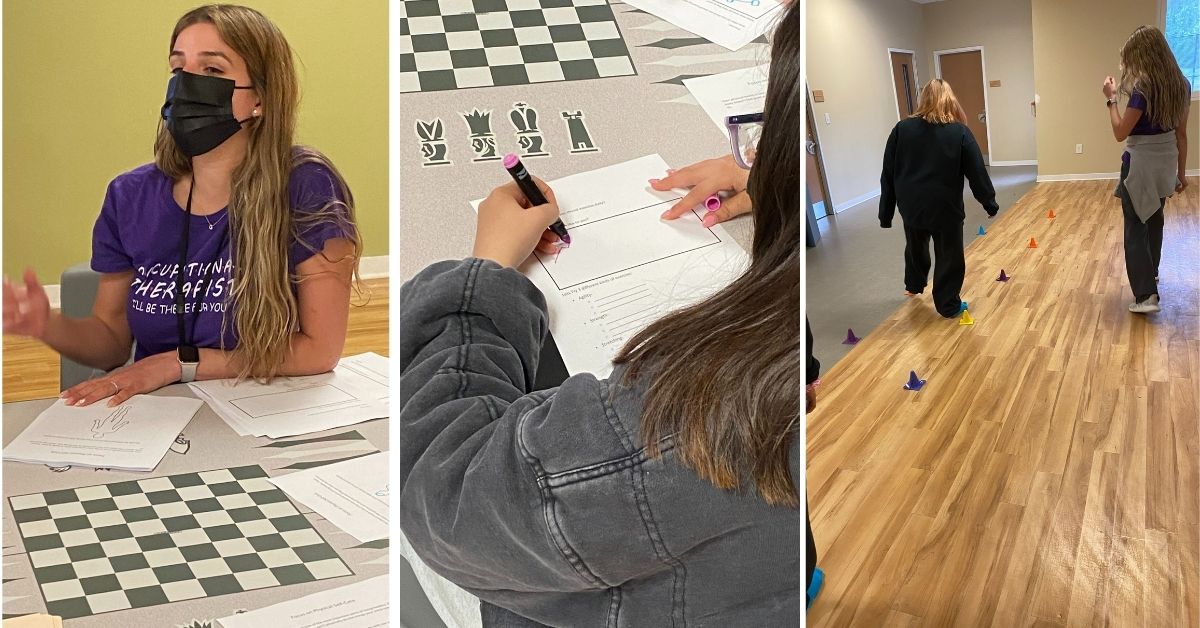Learning to Cope: Children in Mental Health Crisis Learn Skills through Occupational Therapy

At left, Occupational Therapist Amanda Cadena explains a written exercise with YCC youth. At center, a youth at the YCC considers her answer to an occupational therapy exercise. At right, Cadena walks a child through a physical exercise to understand the importance of balance.
Over 1,000 North Carolina children have received life-changing mental health services after walking through the doors of the SECU Youth Crisis Center (YCC), a Monarch program, located in Mecklenburg County.
The YCC began offering services in late December 2017 and celebrates its fourth anniversary continuing to serve youth ages 6 through 17 years old who are experiencing a mental health or substance use crisis.
The YCC serves as a much-needed mental health resource for parents, guardians and community agencies who refer youth for services. Kiana Boatwright, MA, QP, the YCC’s Crisis Administrator, said most notably during the last year of the pandemic the YCC has seen a steady census of children in need mainly through community and agency referrals. She explains that the center’s services are geared toward the personalized mental health needs of each child to help them learn skills that will aid in navigating their world.
The most common mental health issues that bring a child to the YCC include suicidal and homicidal ideation, depression and medication management issues. The first steps in assisting a family, Boatwright shares, is crisis stabilization including any medications. From there, the team works to establish other clinically necessary services and supports needed upon discharge that may include in-home services and supports.
Specifically, the YCC offers short-term stabilization for an acute psychiatric episode in a secure setting that provides a safe and healthy environment where healing can begin, Boatwright describes. YCC services include an age-appropriate treatment plan offering individual and group settings, medication as needed, and access to a variety of individual and family services to help manage their illness.
Boatwright emphasizes that children admitted for services at the YCC are served through a person-centered collaborative, interdisciplinary team approach made up of therapists, psychiatrists, behavioral technicians and nursing staff. Personalized care is at the core of YCC’s approach with daily team meetings that provide updates on each child and additional supports needed so everyone is on the same page.
“Everyone on the team looks at the child’s care with a different lens and contributes to the care that the child needs while receiving services at the YCC,” says Occupational Therapist Amanda Cadena, OTR/L, part of the YCC team who interacts directly with the youth to help them in healing.
Occupational Therapy (OT) was initially incorporated into the YCC’s program in 2020 to assist children through sensory-based coping techniques. Cadena works closely with the entire YCC team to create individualized OT plans for each child.
“The treatment team meets daily. How is the child doing? How did the night go previously? Are there any triggers? Additional supports needed? These questions are discussed when staff meetings are held daily and support continuity of care. The registered nurses, clinical team, therapists, medical director, case managers, behavioral technicians, the utilization manager – everyone is on the team meeting,” Boatwright indicates.
Youth learn valuable skills to take with them once they leave such as ways to cope with anger, resentment and frustrations. “We let them know that they are going to get frustrated or angry but there are always appropriate ways to deal with those,” Boatwright notes. “There is a different way to deal with children. We are very therapeutic. We try to be hands off. We utilize de-escalation skills at all times.”
The YCC staff understands the heartbreak of families and children served during a mental health crisis. “I receive a sense of teamwork and a sense of accomplishment because we see the patients enter one way. They may arrive combative and not willing to stay and when they leave they are super thankful,” Boatwright says of a child’s transformation.
“It is extremely rewarding to see the hard work that you put in as a collective team come to fruition,” Cadena shares of the team effort and watching a child return home.
As a child is preparing to leave the YCC after receiving services, staff and youth join for what they call a “closing circle.” This is when each person says one positive attribute or well wish for the child being discharged. Boatwright said there have been many impactful responses that are shared by staff and children being served.
For more information about Monarch’s SECU Youth Crisis services and to take a virtual tour, visit here. To hear more about how occupational therapy services are helping youth in crisis, click on the video below.
Posted on: Tuesday January 11, 2022
